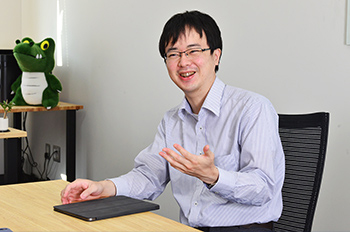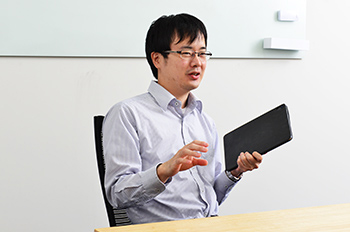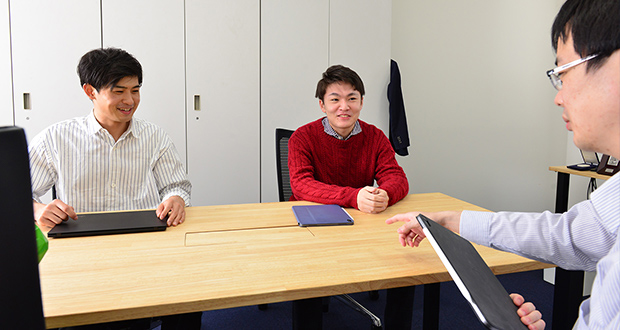Intelligent Integrated Systems,
Information Systems Engineering
Associate Professor
Shiomi Jun
Please tell us about your research.
I am researching the design of low-power, integrated circuits that can seamlessly blend into society. Also, there is a technology called optical computing which uses light to compute. I have recently started researching the next generation of computing technology using optical computing.
Integrated circuits that blend in with society can be imagined as recent edge devices and IoT. In order to operate a device that can be attached to a person's body, a wall, or an object, and can run on battery power for 10 years or so, a low-power device is absolutely necessary. Therefore, I am researching the design of such low-power integrated circuits that do not overly consume batteries. For example, I am trying to devise circuits to reduce energy consumption as much as possible, or to create circuits that work properly even when operated at lower voltages than originally expected, voltages that would normally never work.
At the root of this research is the fact that variations in circuit performance occur. Specifically, even if the same semiconductor device is made, a slight variation in performance will occur. Furthermore, the performance of semiconductor devices gradually deteriorates as they continue to be used. A computer is made up of billions of transistors, which are used as switches in circuits. If such unexpected variations and degradation accumulate in individual transistors, the circuit assembled with the transistors will not work as intended and will eventually fail. Furthermore, if even one transistor malfunctions, the entire system will fail. If the voltage is lowered in order to draw out the power, this variation is accentuated even more and the circuit stops working.
If we compare it to a human being, there are sometimes people who miss school classes because of a cold. This is unavoidable with humans, but with integrated circuits, even a single absence is unacceptable. There are billions of transistors, and they can't work properly unless everyone is there. It's a collective responsibility. The fact that billions of transistors all need to work for decades is quite a miracle in the first place.
Therefore, it is important to create a circuit that takes into account the fact that performance will vary and deteriorate. For example, I am researching technology to design circuits that work properly even if the billions of transistors vary or deteriorate. If this becomes possible, devices such as smartphones, which until now have had to run on large batteries, will be able to operate even with a very weak power source.


Could you tell us what made you decide to start research?
I entered the Department of Electrical and Electronic Engineering in the Faculty of Engineering at Kyoto University. At the time, I didn't have a specific research interest in mind, but I vaguely wanted to work on quantum computers. At the time, however, there were no laboratories for quantum computers at Kyoto University.
At that time, I had a lot of opportunities to interact with video games and computers, so I decided to go to an integrated circuit laboratory and joined the Onodera Laboratory, Graduate School of Informatics, Kyoto University. My research there was to design circuits with very low power, and I tried to create circuits with half or a third of the voltage used in normal circuits. From there, I continued my research on low-power circuits.
Recently, I have had the opportunity to participate in research on modulating light for computation and controlling light on semiconductor chips. There, I am working on new computation computers.
New computation computers are part of the research on secure computers. There is an index called tamper resistance. When integrated circuits operate, electricity flows through them and they have electromagnetic waves, and if you pick up on the electromagnetic waves, you can find out what they are doing inside. Therefore, security problems have been pointed out, such as it being possible to find out the secret key if you cryptographically process the electromagnetic waves.
The main idea of this project is to create a computer that modulates light to perform calculations without leaking information to the outside world. For example, unlike the voltages and currents handled by conventional integrated circuits, light has the characteristics of a wave. If we create a safe computer using light by hiding logical information in physical quantities such as the amplitude and phase of the waves, which cannot be expressed by conventional electric-based integrated circuits, the information will not leak out. I am involved in such a project.
Low-power devices and secure computers are research themes that have only recently begun to be brought into connection. A good example of this is the IoT. The IoT is used to measure people's heartbeats, control automobiles, etc. Therefore, the IoT needs to be housed in low-power and secure devices. So, recently, research is being done to connect the two.










